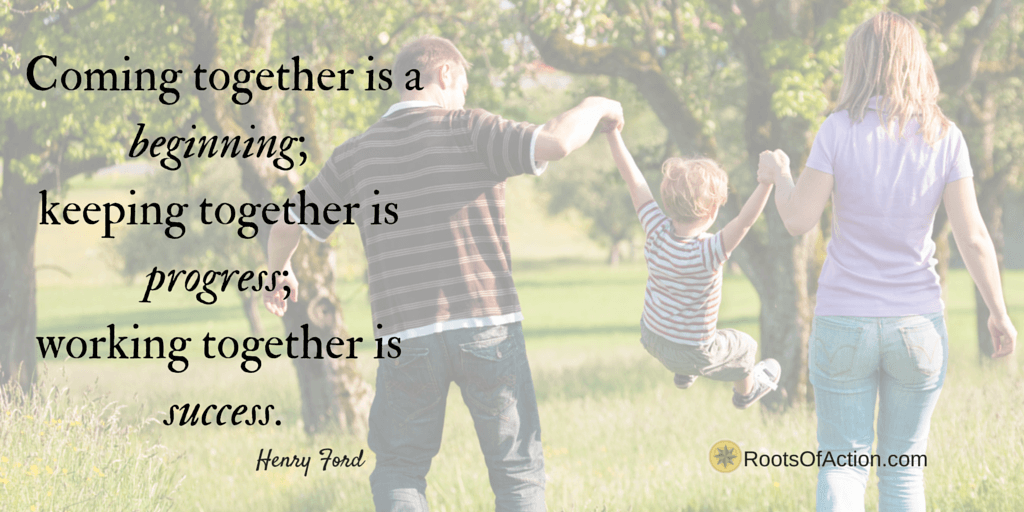
Parental relationships can be messy and confusing for kids, even in the best of circumstances.
Children learn about intimate relationships from their parents. So it’s not too surprising that negative patterns can be repeated from one generation to the next.
What should parents know about their own intimate relationships that can significantly impact their children’s future? What can you do today that will help your child’s relationships develop in positive ways?
Research shows that children of divorced parents may shy away from intimate relationships when they grow up, often fearing rejection and discontent. Family break-ups have been linked to increased risks of psychosomatic problems in children, including concentration, sleep difficulties, headaches, tension, etc. But what about children who live with two parents?
It turns out that many types of spousal relationships can be as harmful to children as divorce.
According to a recent study by Michal Einav published in The Journal of Psychology: Interdisciplinary and Applied, children learn how to have close relationships by observing and interacting with their parents or caregivers. Einav’s research suggests that the quality of a marital relationship significantly impacts expectations children have about their own future intimate relationships.
How do you know if your spousal relationship is a healthy model for your children? First, consider the ways your kids may be at risk.
Relationship Questions for Parents
If your answer to any of the following questions is “yes,” your child’s future adult relationships may be negatively impacted.
- Does the amount of stress you feel in your marital relationship make you emotionally unavailable to your child’s needs?
- Do you and your partner use inconsistent disciplinary strategies with your child?
- Do you rely on your partner to meet all of your emotional needs, like your sense of self-worth and life meaning?
- Do you or your partner believe that space and distance should be the norm in your relationship, with little expectation of closeness?
- Do you focus primarily on your child’s problems as a way of distracting yourself from issues with your spouse?
Research on Parental Relationships
Studies in family relationships provide insights to the questions posed above, suggesting that children’s perceptions of their parent’s relationship quality affect the way they learn to engage in social interactions.
When parents feel a great deal of stress in their own relationship, they rarely have enough emotional energy left for their child. Researchers refer to this as the “spillover effect.” Studies continue to link the spillover tensions experienced by adults to the relationships they have with their children, and to the development of children’s expectations about their own future intimate relationships.
Research shows that the way parents discipline children varies with the status of the spousal relationship. Parents who disagree on a multitude of daily challenges often disagree on how their children should be raised or disciplined. Also, when a parent is angry with a spouse, the disciplining parent tends to be harder on the child. Whatever the situation, the result is the same. The child experiences unclear and contradictory boundaries. This makes children feel insecure and confused, leading to tension with parents.
A study by Dixon, Gordon, Frousakis, and Schumm published in Family Relations, found that adults who rely on their partners for a sense of self-worth usually have high levels of anxiety in their relationships. Slight frustrations between these partners are noticeable by children and often result in family conflict. The same study found similar results in relationships where one partner rejected demands for intimacy from the other. Children can sense resentment and observe the unavoidable conflict that occurs when one spouse doesn’t meet the expectations of the other.
When there is discord in a spousal relationship, one natural solution is to avoid the elephant in the room by focusing attention on your child. The child becomes the problem, rather than the adults. In a review of the research by Erel and Burman published in the Psychological Bulletin, this type of coping mechanism is a distraction that usually harms the parent-child relationship. Why? Because the child feels blamed for the conflict in the family. Oftentimes, the child takes on the role of maintaining family harmony. This process is often successful at reducing tensions between parents, but leads to a child who feels rejected and alone.

Building Healthier Relationships
The ability to have and maintain an intimate relationship is a key aspect of your child’s adult happiness and well-being. Reflecting on your life-partner relationship today can create healthier relationships for your children in the present and future. See the next section for excellent resources!
Let’s face it. Not all spousal relationships are positive for kids. But the good news is you can still develop a close, loving relationship with your child. Because as it turns out, a secure relationship with at least one caregiver is critical to a child’s positive development through life. When you have a deep and enduring emotional bond with your children, they will seek you out when they are upset or feel threatened. Your sensitive, caring response is what they need most—to feel seen, felt, and understood. This simple parental bond improves your children’s social skills and helps them relate intimately with others as they get older.
Many children observe and experience less than ideal relationships between their parents and do not grow up to use these interactions as a model for their own life. Research in positive psychology shows this happens when caregivers pay attention to children’s inner strengths, like resilience, self-awareness, and caring. Those abilities act like an internal compass to guide them on successful paths through life, often regardless of their life circumstances.
Recommended Books for Parents
Following are a few helpful books for building better partner relationships:
References
Amato, P. R., & DeBoer, D. D. (2001). The transmission of marital stability across generations: Relationship skills or commitment to marriage? Journal of Marriage and Family, 63, 1038–1051.
Bowlby, J. (1982). Attachment and loss: Retrospect and prospect. American Journal of Orthopsychiatry, 52, 664–678.
Dixson, L. J., Gordon, K. C., Frousakis, N. N., & Schumm, J. A. (2012). A study of expectations and the marital quality of participants of a marital enrichment seminar. Family Relations, 61, 75–89.
Erel, O., & Burman, B. (1995). Interrelatedness of marital relations and parent–child relations: A meta-analytic review. Psychological Bulletin, 118, 108–132.
Hall, S. S. (2006).Marital meaning: Exploring young adults’ belief systems about marriage. Journal of Family Issues, 27, 1437–1458.
Michal Einav (2014) Perceptions about parents’ relationship and parenting quality, attachment styles, and young adults’ intimate expectations: A cluster analytic approach, The Journal of Psychology: Interdisciplinary and Applied, 148:4, 413-434.
Image Credit: Thierry Vialard
Published: March 31, 2016



